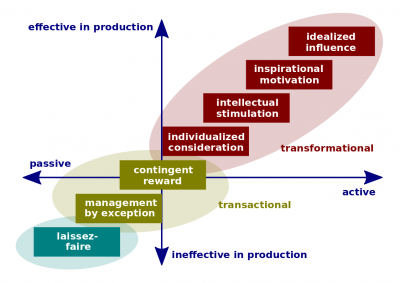Difference between revisions of "Inspirational motivation"
(→Related coursework) |
|||
| (One intermediate revision by the same user not shown) | |||
| Line 1: | Line 1: | ||
| − | [[File:Leadership-styles.png|400px|thumb|right|[[Full Range Leadership Model]]]][[Inspirational motivation]] (hereinafter, the ''Style'') is leadership style of someone who has the ability to inspire and motivate followers and is believed to be a [[transformational leader]]. If this leader can also exercise [[idealized influence]], this leader can be considered as charismatic. | + | [[File:Leadership-styles.png|400px|thumb|right|[[Full Range Leadership Model]]]][[Inspirational motivation]] (hereinafter, the ''Style'') is [[leadership style]] of someone who has the ability to inspire and motivate followers and is believed to be a [[transformational leader]]. If this leader can also exercise [[idealized influence]], this leader can be considered as charismatic. |
| Line 12: | Line 12: | ||
[[Transformational leadership]]. | [[Transformational leadership]]. | ||
| − | ==Related | + | ==Related lectures== |
| − | + | *[[Leadership Quarter]]. | |
[[Category: Septem Artes Administrativi]][[Category: Articles]] | [[Category: Septem Artes Administrativi]][[Category: Articles]] | ||
Latest revision as of 18:49, 4 January 2019
Inspirational motivation (hereinafter, the Style) is leadership style of someone who has the ability to inspire and motivate followers and is believed to be a transformational leader. If this leader can also exercise idealized influence, this leader can be considered as charismatic.
Full Range Leadership Model
- Main wikipage: Full Range Leadership Model
Full Range Leadership Model. A model that depicts seven managerial leadership styles on a continuum: (1) laissez-faire, (2) management by exception, (3) contingent reward leadership, (4) individualized consideration, (5) intellectual stimulation, (6) inspirational motivation, and (7) idealized influence.
Transformational leadership
- Main wikipage: Transformational leadership
